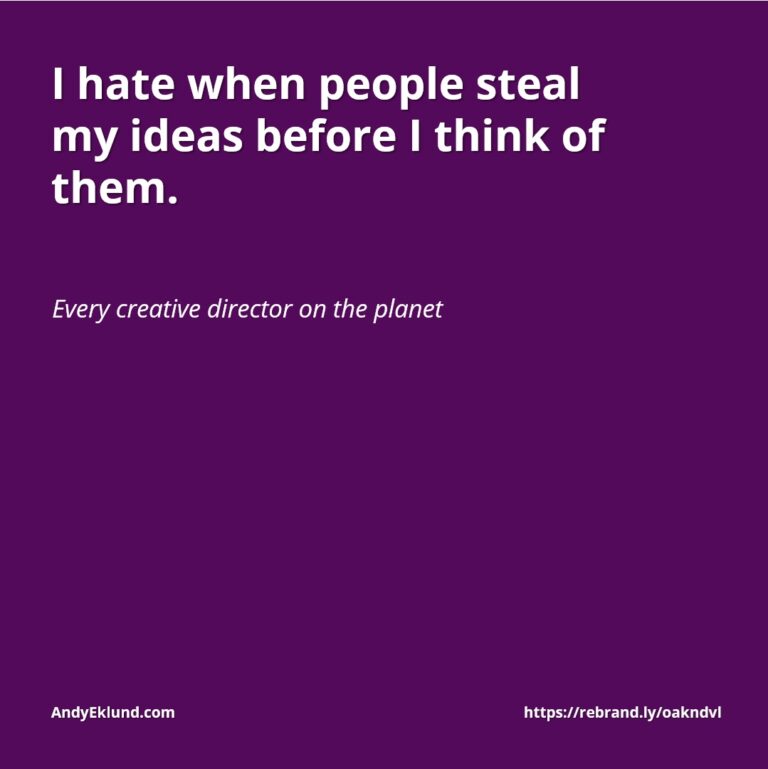At some point in your career, you will meet a person who hates your good idea.
I’m not talking about someone who hates your bad idea. Or that you’re the only person who doesn’t see your bad idea as … well, bad. No, I’m speaking about the person who refuses to consider your good idea, and very likely will not tell you why.
As a creative director, I’ve had several clients who acted in this way. The one I remember most would sit silently during the presentation and, after hearing each idea, slowly twisted her lips and said, “Umm, no.” She refused to elaborate, even when prompted.
At first, I didn’t understand why someone would be dismissive of a potentially good idea. After all, we were there to help. Over time, I began to see a pattern emerge – from our team, of the client, about the situation – and from there I also began to see options, to elicit feedback, and sometimes, to gain approval.
Here’s what I learnt.
When Someone Hates Your Ideas
Focus on the situation, not necessarily the person.
In hindsight, it was easy to focus on what was wrong with the client. Instead, we should have focused on the situation. What did we do, or more likely, what didn’t we do? More often than not, we focused on the end result: what happened at the end. The client however was focusing on the goal, and our idea, once executed, wouldn’t always help achieve the goal. Ultimately, I began asking myself before I chose the best idea for presentation this question: if the client’s money were my own, would I approve the idea? If I ever said ‘no,’ I hadn’t found the best idea yet.
The ultimate idea is their responsibility.
They’re in charge. It’s their reputation and credibility on the line. Shareholders, board of directors, influential colleagues, their boss – all look to this senior person for the success of the organization, not to you. It may seem egomaniacal to you, but to others it’s the sign of a leader.
This is business. Don’t take it personally.
Don’t wrap your personality around your idea. Protecting the idea is one thing, but preventing it from changing in healthy ways is not.
They have more information than you.
In a senior position, this person very likely has insight into a situation that you do not, or privileged information that is legally or morally bound to the senior person. It might be nothing more than a ‘gut reaction’ to the events, based on their experience or expertise. Very often, the best thing you can do is stand back and learn.
They see a bigger picture than you.
It’s easy to get caught up in your own day-to-day situation, or in the politics of your team or department. By the nature of their position, the senior person must have a broad perspective across the entire organization. They see the ripple effect of an idea in one area upon another. One of the best things you can do for yourself is to bring in outside people, particularly those who may give you an insight into the senior person’s decisions or priorities.
The decision has already been made.
If so, you have to ask yourself why you’re trying to change what’s already done. For whatever reason, you are late to the party. Disrupting the idea now is just as destructive as being the person who says no.
“Andy, none of these will work. What then?”
Is it really a battle worth fighting? If it is, thoroughly – and I mean thoroughly – prepare yourself. Stand up for yourself. Sometimes the senior person is looking for a worthy adversary, or they’re deciding who has mettle and who does not. But always have two things in your back pocket: 1) a plan to manage the risk, and 2) Plan B.
“No seriously, this person is evil.”
Are you sure? It’s not to say these people don’t exist, but usually there’s an explanation somewhere for their behaviour. If you can’t understand it, or simply can’t take working with them, you have two choices.
1. Leave. It’s a drastic step, and I’d seriously consider all other alternatives before ending my employment. I’d also get someone neutral because if this state describes you, you don’t want to make any decision based on anger.
2. Keep your head down. The very few people I’ve met in my career in this ‘evil’ category have burnt their way through the organization and did not last long. And at the same time, it’s ironic that I learnt more from these people than any of my favourite mentors. Sure, I learnt how not to do something, but it’s a lesson nonetheless.
Any other suggestions on how to deal with an extremely negative (and often silent) decision maker? Please add your thoughts or comments below.



2 Comments
Hi, do you mind if I share this article? Do I need to buy reprints? Can I share as is? Thank you! Love your work!
Please, use as is or direct people directly to the website. Thank yoU!